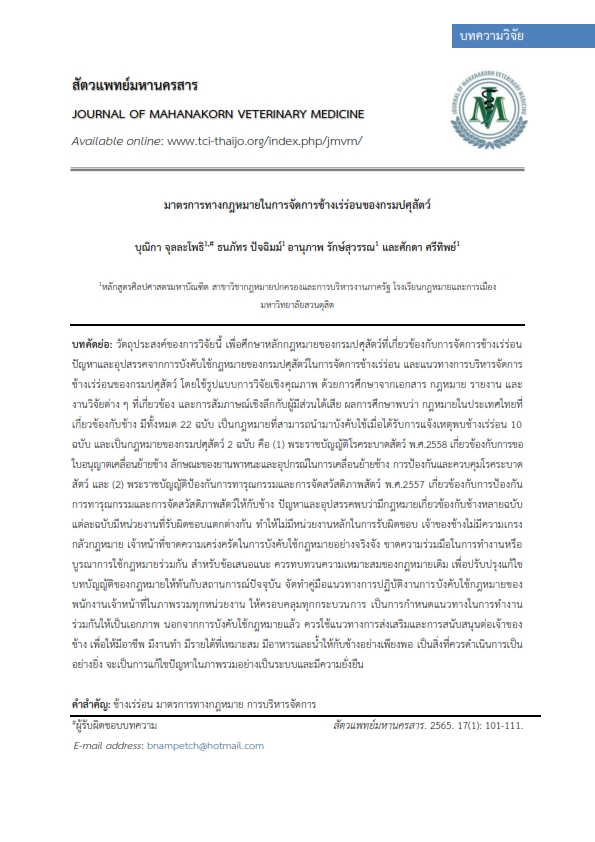Legal Measures concerning the Management of Elephant Street Begging for Department of Livestock Development
Main Article Content
Abstract
The objective of this research was to study the legal principles of the Department of Livestock Development related to the management of elephant street begging. Problems and obstacles from law enforcement and guidelines for the management of elephant street begging. By use qualitative research with the study of documents and other related works and in-depth interviews with stakeholders. The results showed that there are 22 Acts in Thailand related to elephants. There are 10 Acts that can be applied to sightings of elephant street begging and there of the Department of Livestock 2 Acts. (1) the Animal Epidemic Act, B.E. 2558 related to obtaining a permit to movement, characteristics of vehicles and equipment for moving, prevention and control of animal epidemics. And (2) the Cruelty Prevention and Welfare of Animal Act, B.E. 2557, related to the prevention of cruelty and animal welfare arrangements. Problems and obstacles, there are many laws related to elephants, has a different authority, no main agency to be responsible. Elephant keeper have no fear of the law, government officers lack the rigor to seriously enforce the law, lack of cooperation in working together. For suggestions should review the appropriateness of the original law to update the provisions of the law to keep up with the current situation. Prepare a manual on the implementation of law enforcement officers in the overview of all departments to cover all processes. In addition to law enforcement should use guidelines for promotion and support to elephant keeper in order to have a career until able to have a suitable income, there is enough food for the elephants. It is something that should be taken seriously. This will solve the overall problem in a systematic and sustainable manner.
Article Details

This work is licensed under a Creative Commons Attribution-NonCommercial-NoDerivatives 4.0 International License.
References
Animal Epidemics Act, B.E. 2558 (2015). Royal Thai Government Gazette, Vol. 132, Section 14 Kor. 2nd March B.E.2558 (2015), 22-41 p. (in Thai)
Bureau of Legal Affairs, Department of Livestock Development. 2021 (30 August 2021). Act. Available from: https://legal.dld.go.th/P15.html. (in Thai)
Chagsuchinda, P. Sukkaseam, C. Mahannop, A. Kanchanapangka, S. Pancharoen, S. Maneeon, P. and Eiampongpaiboon, P. 2004. An extensive study on solving problems of domesticated and wild elephants in Thailand. Research report, The Senate: Sub - committee on Natural Research. (in Thai)
Chiengthong, J. 1998. Tourism and its impact on elephant herders in Surin. Research report, Thailand Development Research Institute, Bangkok. (in Thai)
Cruelty Prevention and Welfare of Animal Act, B.E. 2557 (2014). Royal Thai Government Gazette, Vol. 131, Section 87 Kor. 26th December B.E.2557 (2014), 4-13 p. (in Thai)
Designated Areas for Sustainable Tourism Administration (Public Organization), Ministry of Tourism and Sports. 2018 (cited 22 April 2021). Safe life, save the elephants. Available from: https://tis.dasta.or.th/dastaknowledge/wp-content/uploads/2018/10/save-elephants.pdf. (in Thai)
Division of Animal Welfare and Veterinary Service, Department of Livestock Development. 2019. Solving the problem of stray elephants and the abuse of domesticated elephants, AC 0625/W34179 (14 November 2019). (in Thai)
Division of Animal Welfare and Veterinary Service, Department of Livestock Development. 2021. Approval of the Elephant Food Sharing Project through the Covid-19 Crisis, AC 0625.03/215 (11 March 2021). (in Thai)
Division of Animal Welfare and Veterinary Service, Department of Livestock Development. 2021. Approval of the Animal Reserve Project for Elephants through the Covid-19 Crisis, AC 0625.03/601 (7 June 2021). (in Thai)
Hat Yai City Municipality, Songkhla Province. 2017 (cited 22 April 2021). People's Guide: Requesting permission to bring elephants to earn money in Hat Yai City Municipality. Available from: https://www.hatyaicity.go.th/files/com_people/2017-04_b3104137e10a648.pdf. (in Thai)
Henprazert, P. 2016. Legal Measures to protection the elephant house in Thailand. ML Thesis, Dhurakij Pundit University, Bangkok. (in Thai)
Kattikrut, S. 2020 (cited 7 October 2021). TAT projects to help communities, help elephants, save the nation. Available from: https://www.77kaoded.com/news/big/1790440. (in Thai)
Meepan, L. 2009. Thesis or issues surrounding and solution to this problem elephant that beg in the streets from Bankhai Chaiyapum province & Bantakang Surin province. MA Thesis, Phranakhon Si Ayutthaya Rajabhat University, Phranakhon Si Ayutthaya. (in Thai)
MGR Online. 2016 (cited 7 October 2021). Manager of the Returning Elephant Project explaining the success of 6 years and preparing to develop into a tourist attraction. Available from: https://mgronline.com/politics/detail/9590000005105. (in Thai)
Notification of Ministry of Agriculture and Cooperatives Re : Thai Agricultural Standard entitled Good Animal Practices for Elephant Facility (TAS 6413-2021) B.E. 2551 (2008). Royal Thai Government Gazette, Vol. 1385, Section 196 Gnor (Special Issue). 25th August B.E.2564 (2021), 25 p. (in Thai)
Pianchob, K. 2007. The problem and management of Kui’s poverty in Surin province. ME Thesis, Chulalongkorn University, Bangkok. (in Thai)
Prasitphol, S. 2012. (cited 15 September 2021). Elephants World. Available from: https://www.stou.ac.th/study/sumrit/4-58/page1-4-58.html. (in Thai)
Punyanitikul, C. 2009. A study on causes of wandering elephants’ problem in Thailand. MS Thesis, Maejo University, Chiang Mai. (in Thai)
Sakulvadhana, R. 1995. Kui : The Elephant Herdsman of Surin. MA Thesis, Thammasat University, Bangkok. (in Thai)
Sawatdiphol, K. 2002. Suitable measure to prevent wandering elephants in Bangkok. MA Thesis, National Institute of Development Administration, Bangkok. (in Thai)
Wirawatcharakorn, C. 2000. Action research on ecotourism in the Mun River valley elephant community. Research report, Surindra Rajabhat University, Surin. (in Thai)


